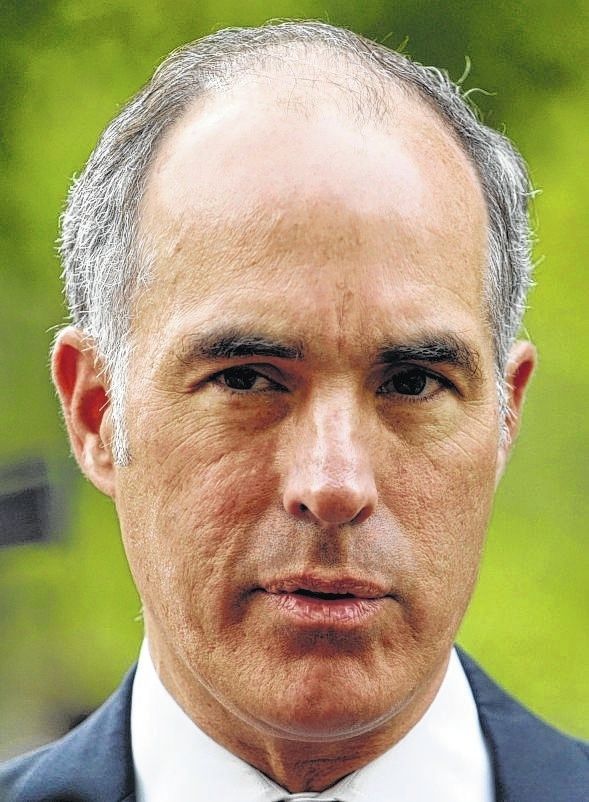Click here to subscribe today or Login.

WASHINGTON, D.C. — New federal regulations targeting sexual assault on college campuses are now in effect, U.S. Sen. Bob Casey said on Wednesday.
“The Campus SaVE Act is, in fact, the most significant update to campus sexual assault provisions of the Clery Act in two decades. As of (Wednesday), all institutions of higher education must be in compliance with these new provisions of the law,” Casey said during a phone-in news conference.
Casey, D-Scranton, was the original sponsor of the Campus Sexual Violence Elimination (SaVE) Act, which was essentially a set of amendments added to the federal Jeanne Clery Disclosure of Campus Security Policy and Campus Crime Statistics Act, or Clery Act, signed in 1990.
President Barack Obama signed the Campus SaVE Act into law as part of the Violence Against Women Reauthorization Act of 2013 on March 7, 2013.
Driven by tragedy
Casey said the Clery Act has been “a key driver of campus safety” over the last 25 years. The law resulted from the Clery family tragedy, in which Jeanne Clery was raped and murdered in her dorm room at Lehigh University in Bethlehem in 1986.
“Her parents pushed for federal action to ensure that colleges have procedures in place to prevent, identify and respond to crimes on college campuses and to warn the campus community if there is an imminent danger,” Casey said.
Before the Clery Act, there were no uniform laws mandating that colleges report crimes on campus to students, employees or the general public.
“The Campus SaVE Act makes a huge step forward in protecting college communities and providing resources for victims of domestic violence or dating violence as well as sexual assault and stalking. So these institutions now have to adhere to the new provisions and we’re very happy that these are going into effect,” Casey said.
“This process always takes too long, but they’re finally taking effect … in time for the new school year for colleges and universities coming up in August,” he said.
Institutions of higher learning that receive Title IV funding must have the following provisions in place or risk a $35,000 fine and suspension or loss of federal student aid funding:
Increased transparency
Beginning in 2013, colleges and universities had to begin collecting and reporting statistics for domestic violence, dating violence and stalking occurring on-campus, on public property within and adjacent to campus, and at non-campus properties such as off-campus student organization housing and remote classrooms. Institutions were already required to report sexual assault statistics.
Institutions must collect statistics from a broad range of campus officials including resident advisors, deans and athletic coaches, campus police or security, and local law enforcement. The law requires disclosures to protect the confidentiality of victims in the disclosures as well as any public record keeping, to the extent provided by law.
Victims’ rights
Institutions must have in place clear, written statements of policy regarding domestic violence, dating violence, sexual assault and stalking, including programs to prevent these tragedies from occurring.
“So we want to do as much prevention as has ever been done before, in addition to honestly helping the victim after an assault,” Casey said.
Institutions must also provide to victims written information regarding their rights and the resources available to them. They must establish clear campus conduct procedures for disciplinary actions taken and the process that a disciplinary regime will implement.
Casey said no victim of sexual violence should have to attend class with or be near the aggressor in any situation, and the school must accommodate the victim’s needs in areas such as class reassignments, transportation and housing.
Conduct proceedings
In addition to reporting to law enforcement, victims also have the option to seek protective or disciplinary action directly with their institution.
Institutions must adopt and disclose policies related to standards of evidence, providing a “prompt, fair and impartial investigation and resolution,” and provide proceedings conducted by officials who who receive annual sexual violence training, including on how to conduct an investigation, protect the safety of victims and promote accountability.
Education programs
Institutions must provide prevention and awareness programs for all incoming students and new employees, along with ongoing prevention and awareness campaigns, that include a statement that the institution prohibits sexual violence; define domestic violence, dating violence, sexual assault, and stalking; defines consent for sexual activity.
The programs must also address the topics of bystander intervention and risk reduction.
Casey said it’s important that students know they have a responsibility to report and/or try to stop sexual abuse from taking place if they are aware that is is happening or have reason to believe it will happen.
Local compliance
Vicki Mayk, director of Public Relations for Wilkes University, said the campus has been compliant with the SaVE Act since March 2013. She said campus sexual assault statistics are available on the university website under the Public Safety tab along with other campus crime statistics, as are the school’s policies regarding sexual assault.
The university implemented “a whole new training policy in our Public Safety Department since we started having armed officers,” who receive the same training as municipal police officers, Mayk said
The officers as well as members of the campus Student Affairs Team also receive training from the Victims Resource Center, Mayk noted.




